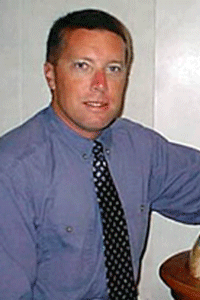ENHS to continue collaborations with other USC researchers
October 1, 2009

Dwayne A. Porter
Raising public awareness that human activities have far-reaching consequences for the environment is a key goal for the Arnold School’s Department of Environmental Health Sciences, says its new chair, Dr. Dwayne A. Porter.
“For too long there has been a bit of a disconnect between the impacts associated with man’s activities and the implications to both environmental health and public health,” said Porter, who accepted his new post this week after serving as interim chair for the past two years.
“A continuing debate is whether development, healthy environments and healthy populations can go hand-in-hand. We believe that they can, but it requires a raising of the public concern by translating our high-quality science into information and products that can both better educate those in our neighborhoods and communities and support improved decision-making by resource managers and public health professionals,” said Porter, who became interim chair when former chair, Dr. Tom Chandler, was named interim dean of the Arnold School.
“I have known Dwayne for 15 years and have observed first-hand in many venues his many gifts for interpersonal communication, fairness to others, and selfless giving of his time and energy to benefit the students, department and school,” said Chandler, who recently became Arnold School dean.
Besides serving as interim chair, Porter also has been graduate director of ENHS and currently directs the activities of the Geographic Information Processing Laboratory within the Baruch Institute for Marine and Coastal Sciences in the College of Arts and Sciences.
He is also on the faculty of the Marine Science Program and directs the activities of the NOAA NERRS Centralized Data Management Office which is national center for estuarine data management and synthesis co-located on the USC campus and in Georgetown.
Porter said ENHS is involved in a wide array of environmental research activities including air pollution, analytical chemistry, aquatic and landscape ecology, marine ecotoxicology, coastal zone management, ecosystem modeling, risk and impact assessment, exposure analysis, genomics, industrial hygiene, occupational epidemiology, nanosciences, remote sensing and Geographic Information System (GIS) studies and water and wastewater treatment.
These activities have long involved collaborations with “other environmental and health programs across campus and we intend to continue and further develop these transdisciplinary research efforts,” said Porter.
Funding for ENHS research is hard to secure in the current economic climate, meaning the department will have to be creative in identifying funding opportunities, Porter said.
“Our responsibilities are two-fold. First, we have to attract and retain the best and brightest faculty and students and develop via partnerships the strongest research teams we can in order to retain and advance the high level of research that has been a trademark of our department and the ASPH and our partners across campus and off campus,” Porter said.
“Second, we have to become more creative in the identification of funding opportunities that can support our research and our students. We cannot rely on the funding opportunities coming to us, but rather we must be proactive in developing new and unique opportunities,” he said.
Porter’s research focuses on the development and application of data fusion techniques and spatial models to study relationships between the natural coastal environment, the built environment and public health.
Particular focus is on land-use management and land-cover patterns to investigate (1) the impact of anthropogenic and physiographic activities on environmental health, and (2) the role of the environmental landscape in public health concerns.
Porter, who has been on the USC faculty since 1993, holds a bachelor’s degree from West Virginia University and master’s and doctoral degrees from USC.
A native of Cross Lanes, WVA, Porter said his attraction to science and academe was part of his upbringing.
“We had 22 houses in this small town on the West Virginia hillside. In those houses we had 22 teachers, ranging from kindergarten to a college president,” he said.
He says his new job means an “opportunity to continue to work with and alongside the most incredible collection of faculty, staff and students one can find anywhere!”



_01.jpg)
_02.jpg)